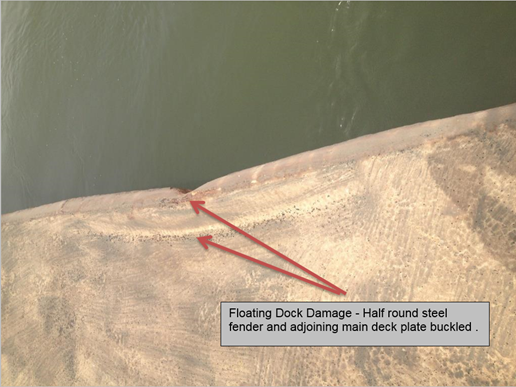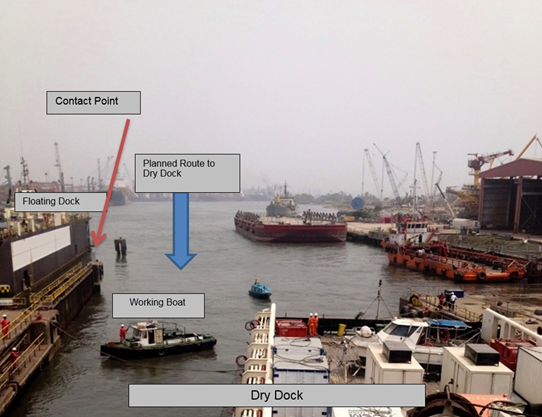Vessel in collision with floating dock
A member has reported an incident in which a multi-purpose support vessel (MPSV) made contact with a section of a floating dock and buckled a steel fender and the main deck forward centre of the dock. The incident occurred as the MPSV was being towed by two tugs (one forward, one aft) to a graving dock.
As the vessel was proceeding towards the dock, the dock master was contacted by the pilot with a request to send two working boats to meet the MPSV, to replace the forward tug. The dock master disagreed with this, as the local arrangements were that working boats were only to assist towing around 200m from the dry dock. The forward tug disconnected and sailed away without prior notification. Efforts made by the pilot to communicate with the master of the forward tug were not successful. The master of the aft tug refused to reposition to push the MPSV from its starboard side, as they were informed that the water was too shallow (8m depth). Thereafter, the vessel drifted to starboard towards the floating dock, collided with it and caused material damage. There were no injuries.


Our member’s investigation revealed the following:
- A plan was in place to tow the MPSV to a graving dock. The tugs did not arrive as planned and were late. When the first pilot arrived on board, he refused to engage tugs due to the condition of the vessel at the time – only the emergency engines were running;
- The vessel’s forward and aft thrusters were non-operational due to ongoing repairs;
- The deck crew and officers carried out a toolbox talk as well as a risk assessment on towing, mooring and unmooring operations;
- The MPSV was docked starboard side to quay, before delivery to the dockyard;
- The pilot was informed about the status of the MPSV. He assured the crew that ‘he was familiar with the dockyard operations, and that the proposed delivery will be carried out successfully’.
Our member made the following recommendations:
- Better and more comprehensive risk assessment for docking operations;
- ‘Stop work authority’ should be implemented and enforced on board if any task is perceived to be unsafe;
- Pre-task planning meeting with all work parties should be mandatory before start of towing/docking tasks.
Members may find it helpful to further consider the relationships between different working parties in shipyards, as discussed in Guidance on safety in shipyards.
Safety Event
Published: 18 April 2016
Download: IMCA SF 10/16
IMCA Safety Flashes
Submit a Report
IMCA Safety Flashes summarise key safety matters and incidents, allowing lessons to be more easily learnt for the benefit of all. The effectiveness of the IMCA Safety Flash system depends on Members sharing information and so avoiding repeat incidents. Please consider adding safetyreports@imca-int.com to your internal distribution list for safety alerts or manually submitting information on incidents you consider may be relevant. All information is anonymised or sanitised, as appropriate.
IMCA’s store terms and conditions (https://www.imca-int.com/legal-notices/terms/) apply to all downloads from IMCA’s website, including this document.
IMCA makes every effort to ensure the accuracy and reliability of the data contained in the documents it publishes, but IMCA shall not be liable for any guidance and/or recommendation and/or statement herein contained. The information contained in this document does not fulfil or replace any individual’s or Member's legal, regulatory or other duties or obligations in respect of their operations. Individuals and Members remain solely responsible for the safe, lawful and proper conduct of their operations.
